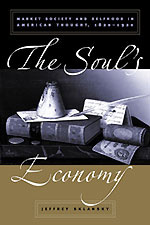 In The Soul’s Economy: Market Society and Selfhood in American Thought, 1820-1920, Jeffrey Sklansky argues that there’s a fundamental shift in American views on freedom and self-determination in the nineteenth century. While the American revolutionaries thought of freedom and self-determination as tied to property and wealth—i.e., material interests—with the rise of romantic authors like Ralph Waldo Emerson and others, freedom and self-determination shifted to some sort of interior freedom of thought.
In The Soul’s Economy: Market Society and Selfhood in American Thought, 1820-1920, Jeffrey Sklansky argues that there’s a fundamental shift in American views on freedom and self-determination in the nineteenth century. While the American revolutionaries thought of freedom and self-determination as tied to property and wealth—i.e., material interests—with the rise of romantic authors like Ralph Waldo Emerson and others, freedom and self-determination shifted to some sort of interior freedom of thought.
[I]n severing the bond between selfhood—or, in the language of the early republic, independence or liberty or virtue—and property, these writers did not necessarily question the transformation of self-employed farming and artisan families into propertyless wage earners. By identifying moral agency with the “inner self” rather than with political and economic sovereignty, they effectively redefined the founding ideals of freedom and democracy in ways that did not directly conflict with the revolution in property relations. (37)
According to Sklansky, they inadvertently “provided ideological cover for class inequality” (72).
Is your body free? Or just your soul?
